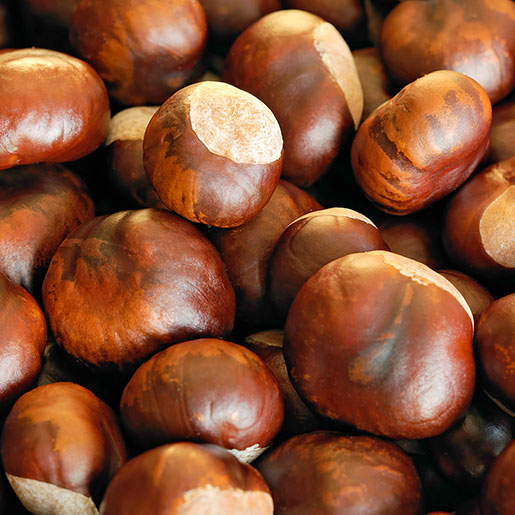Horse Chestnut

Common Names: horse chestnut, buckeye, Spanish chestnut
Latin Names: Aesculus hippocastanum
Background
- Horse chestnut is a tree native to parts of southeastern Europe. Its fruits contain seeds that resemble sweet chestnuts but have a bitter taste.
- Traditionally, horse chestnut seed extract was used for arthritis, pain and swelling, menstrual cramps, hemorrhoids, and other conditions.
- Today, horse chestnut seed extract is promoted for chronic venous insufficiency (CVI; poor blood flow in the veins of the legs, which may lead to leg pain, swelling, itchiness, and other symptoms), irritable bowel syndrome, male infertility, and other conditions.
How Much Do We Know?
- Some studies in people have looked at horse chestnut seed extract for CVI, but very little research has been done on its use for other conditions.
What Have We Learned?
- A 2012 systematic review of 17 studies suggested that horse chestnut seed extract can improve symptoms of CVI. Results from one of these studies suggested that horse chestnut seed extract may be as effective as wearing compression stockings. The reviewers noted, however, that there is a need for more rigorous, large-scale randomized controlled trials to assess the efficacy of this treatment option for CVI.
- Small amounts of research have been done on horse chestnut seed extract for male infertility associated with varicocele (a swelling of veins inside the scrotum) and for irritable bowel syndrome, but there’s not enough information to draw definite conclusions about its effects on either condition.
What Do We Know About Safety?
- The raw seeds, bark, flowers, and leaves of horse chestnut are unsafe when used orally because they contain a toxic component. Standardized horse chestnut seed extracts, from which this component has been removed, are likely safe for short-term use and have been used safely in research studies for up to 12 weeks.
- Horse chestnut seed extracts are generally well tolerated but may cause side effects such as dizziness, digestive upsets, headache, and itching in some people.
- Little is known about whether it’s safe to use horse chestnut seed extract during pregnancy or while breastfeeding.
Keep in Mind
- Take charge of your health—talk with your health care providers about any complementary health approaches you use. Together, you can make shared, well-informed decisions.
- If you take any type of medicine, talk with your health care provider before using any herbal product; some herbs and medicines interact in harmful ways.
- Federal Regulation of Herbal Products
- Depending on what’s in them, how they’re intended to be used, and how they’re administered (orally or topically), herbal products are regulated in a variety of ways. Many herbal products intended for oral use are marketed as dietary supplements. The regulatory paths for making and distributing dietary supplements are different than those for drugs.
- Unlike drugs, dietary supplements are not approved by the U.S. Food and Drug Administration (FDA) before they are sold to the public. When public health concerns arise about the safety of a dietary supplement or an ingredient including an herb, the FDA can take action to protect the public. Manufacturers and distributors of supplements are responsible for evaluating the safety and labeling of their products before marketing to ensure that they meet all regulatory requirements.
NCCIH Clearinghouse
The NCCIH Clearinghouse provides information on NCCIH and complementary and integrative health approaches, including publications and searches of Federal databases of scientific and medical literature. The Clearinghouse does not provide medical advice, treatment recommendations, or referrals to practitioners.
Toll-free in the U.S.: 1-888-644-6226
Telecommunications relay service (TRS): 7-1-1
Website: https://www.nccih.nih.gov
Email: info@nccih.nih.gov (link sends email)
PubMed®
A service of the National Library of Medicine, PubMed® contains publication information and (in most cases) brief summaries of articles from scientific and medical journals. For guidance from NCCIH on using PubMed, see How To Find Information About Complementary Health Practices on PubMed.
Website: https://pubmed.ncbi.nlm.nih.gov/
Office of Dietary Supplements (ODS), National Institutes of Health (NIH)
ODS seeks to strengthen knowledge and understanding of dietary supplements by evaluating scientific information, supporting research, sharing research results, and educating the public. Its resources include publications (such as Dietary Supplements: What You Need To Know) and fact sheets on a variety of specific supplement ingredients and products (such as vitamin D and multivitamin/mineral supplements).
Website: https://ods.od.nih.gov
Email: ods@nih.gov (link sends email)
Key References
- Horse chestnut. NatMed Pro website. Accessed at naturalmedicines.therapeuticresearch.com on May 23, 2024. [Database subscription].
- Pittler MH, Ernst E. Horse chestnut seed extract for chronic venous insufficiency. Cochrane Database of Systematic Reviews. 2012;11(11):CD003230. Accessed at cochranelibrary.com on May 23, 2024.
This publication is not copyrighted and is in the public domain. Duplication is encouraged.
NCCIH has provided this material for your information. It is not intended to substitute for the medical expertise and advice of your health care provider(s). We encourage you to discuss any decisions about treatment or care with your health care provider. The mention of any product, service, or therapy is not an endorsement by NCCIH.